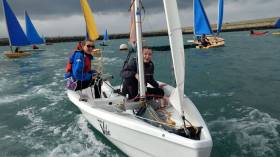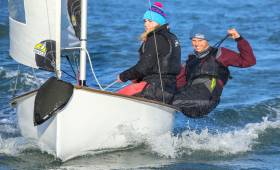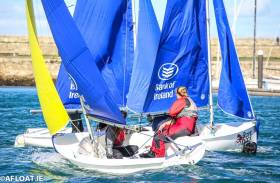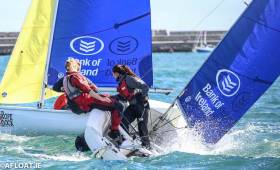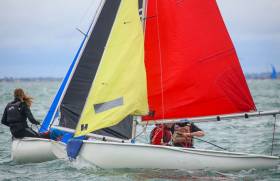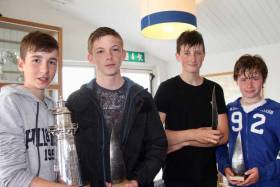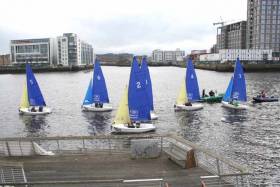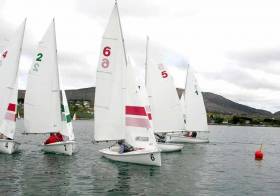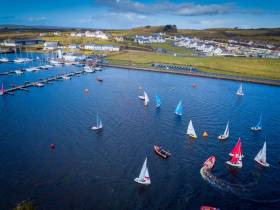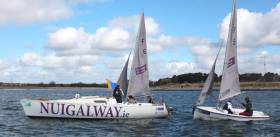Displaying items by tag: Team Racing
Gonzaga College & Irish National Sailing Club Launch Team Racing Initiative
This year Gonzaga College SJ and the Irish National Sailing Club are launching an initiative to promote team racing in Dublin schools. The event will consist of one day's team racing using the INSC’s fleet of double-handed dinghies. It is open to all Leinster schools and schools can field more than one team. In the long term, it is hoped to build the event into a league and possibly introduce a fleet for younger sailors using RS Feva double-handed dinghies.
The organisers believe there are many benefits to developing the sport of team racing in schools. It improves young sailors skills and knowledge of the racing rules, it promotes another level of friendly competition among schools while allowing boys and girls schools to compete against each other. It prepares young sailors for the very competitive College sailing circuit.
To get this event moving, INSS need your help! The Irish National Sailing Club has through its sister school the Irish National Sailing & Powerboat School has a large fleet of double-handed dinghies along with the relevant rescue craft, committee boats etc. INSS is lacking in experienced team racing management such as committee boat members and more importantly experienced team racing umpires and judges. For this, INSS are looking for your help.
Are you an experienced team racing umpire or race organiser?
Or are you an experienced team racer at any level looking for a fun way to make the transition to becoming a team racing umpire or race organiser?
If so INSS would like to hear from you, please email Fiachra Etchingham [email protected] or Kenneth Rumball [email protected]
The event will be run on January 16 from the INSC clubhouse on the West Pier in Dun Laoghaire Harbour. It is hoped to run a training day before this.
OxCamb SS Exodus Beat Royal St. George in IDRA /ITRA 70th Anniversary Team Racing National Championships
The weather provided perfect conditions for the IDRA /ITRA 70th Anniversary Team Racing National Championships hosted by the Royal St George YC in Dun Laoghaire this past weekend. Sixteen teams did battle and each was provided with 14 contests over the course of 124 races at the weekend. It was obvious from the first race that the George Knights were determined to retake the trophy but Oxford Cambridge Sailing Society - an alumni team, was equally steadfast in racking up maximum wins on the first day. Around the fringes, Right Shift Sailing (3rd) which were effectively a Trinity team and Cork1 (4th) from UCC were determined that the Dublin Teams were not going to get it all their own way. Ladies who Launch (5th) comprising Mary O’Loughlin, Diana Kissane and Lisa Tait were going to give the boys a run for their money.
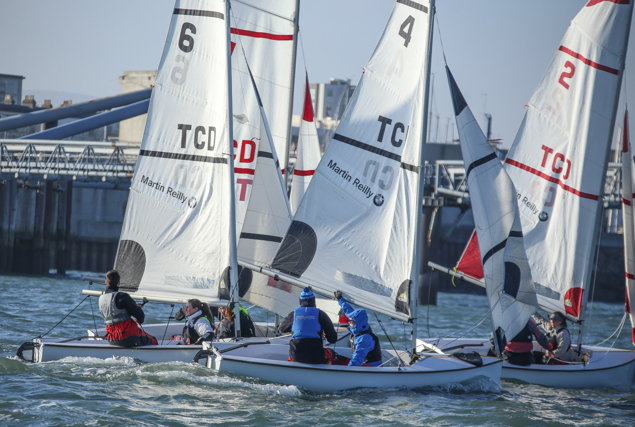 70th anniversary ITRA team racing in Dun Laoghaire Harbour Photo: Afloat.ie
70th anniversary ITRA team racing in Dun Laoghaire Harbour Photo: Afloat.ie
Darkness curtailed sailing at 16.15 when lighting up time regulations forced the fleet ashore to refresh and await the epic rugby battle in Lansdowne Road.
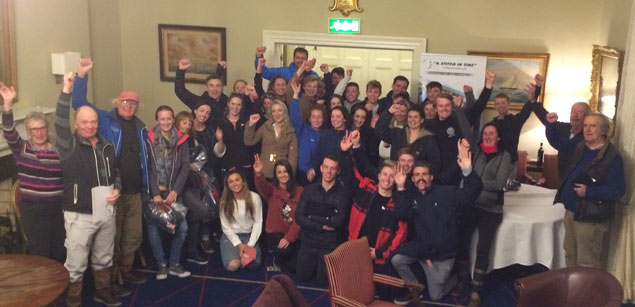 The IDRA ITRA 70th Team Racing Prizegiving at the Royal St. George Yacht Club
The IDRA ITRA 70th Team Racing Prizegiving at the Royal St. George Yacht Club
Perfect team racing conditions prevailed on Sunday when the teams took to the water in a 13 knot easterly. The podium places were determinedly fought for: Right Shift Sailing winning the tie-break against Cork 1 for the silver medal position. In the knockout finals, OxCamb SS Exodus beat the George 3-1 although the Knights had prevailed in the round robin. A capsize thwarted the Knight’s efforts.
Silver Fleet winners were Reach Around and George Youths won the youth prize.
Many thanks to the sponsors Adrian Lee Partners and Stitch in Time, the volunteers Jimmy Fitzpatrick, Dave Lovegrove and David Williams who ran the racing and the umpire team led by recently appointed International Umpires Cxema Pico and Chris Lindsay. CIT Cork, Trinity and the George kindly provided the craft sailed. Final thanks are due to the George and Eunice Kennedy -ITRA Secretary who organised the event, cajoled the teams and whose Herculian nay Granuailean efforts ensured the 70th success on her birthday.
Results
IDRA 70th Open Event 1, Oxon-Camb SS Exodus 2. George Knights 3. Right Shift Sailing
ITRA Irish National Championships 1st.George Knights 2nd.Right Shift Sailing 3rd.Cork1
Oxford-Cambridge SS Exodus : (Winners)
James Cross & Emma Machley;
Peter Gray & Hermione Stanley;
John Platts-Mills & Maddie Jackson.
George Knights: (Gold Medal and second overall)
John Sheehy & Jodie-Jane Tingle;
Nick Smyth & Rachel McManus;
Ger Owens & Michelle Rowley
Right Shift Sailing: (Silver Medal)
Noah McCarthy; Gleb Romanchilik & Trudy O’Hare; Douglas Elmes
Cork1 (Bronze Medal)
Mark Hassett & James McCann
Fionn Lyden & Amy Harrington
Darragh MacCormack & Lisa Smyth
Reach Around (Silver Fleet winners)
Conor Murphy & Cliodna Connolly
Philip Doran & Bella Moorehead
Cian Mullen & Ally Moorehead
Ladies Who Launch
Mary O’Loughlin; Diana Kissane & Jenny Andreasson; Lisa Tait & Lynn Reilly.
70th IDRA/ITRA Irish Team Racing Championship at Royal St. George Yacht Club
Some sixteen teams will do battle for the Miss Betty IYA junior team racing trophy presented by Clayton Love Snrthis weekend in the Royal St George YC in Dun Laoghaire Harbour. What marks this occasion is that it is 70 years since the first time the event was run by the then IDRA forerunner of the IYA more recently the ISA, and now known as Irish Sailing.
On foot of an invitation by Dun Laoghaire sailors to West Kirby SC in 1947 to come over and race, the protagonists decided after the first day’s fleet race it would be more fun if they changed the rules to stimulate more boat on boat competition. The following year was to be the first official competition under Team rules in WKSC followed by a return event in Dun Laoghaire.
Unfortunately, WKSC could not get official recognition as a ‘Team’ event from the then not too progressive Yachting Association. The IDRA as ever gave the Dun Laoghaire event that recognition in 1948 thus pipping the UK to the claim of the longest running Team Racing event. Fittingly the Royal St George YC is as then, hosting the event. The George has been the keeper of the flame since then winning many home titles and lifting the reciprocal event’s Wilson Trophy three times. Team Racing is thriving in the college scene with some twenty-seven teams competing regularly in their four provincial events and the Irish Universities Championships. David Harte set up a fantastic team racing centre in Schull Community College from where he feeds the college scene consistently with champions. He captured the World Team Racing Championship event for Schull in 2012 building 18 TR boats that he designed for that event. His youth team barely lost out to GBR in the Youth Gold Medal decider.
The George had run the Worlds in 1999. There are team racing fleets all around the country most recently Queens Belfast, Sutton Dinghy Club and Galway. The colleges are well represented next weekend by UCC, UCD, CIT Cork, DCU and Dublin University. Trinity Alumni led by Dan Gill and John Sheehy’s George Knights are reforming to do battle with the young pretenders and holders UCC led by Mark Hassett. Oxford Sailing Society is coming to see what all the fuss is about: dark horses, maybe. Mary O'Loughlin and Diana Kissane of Howth have a Ladies Who Launch team entered and Billy Clarke has assembled an old Schull boys brigade.
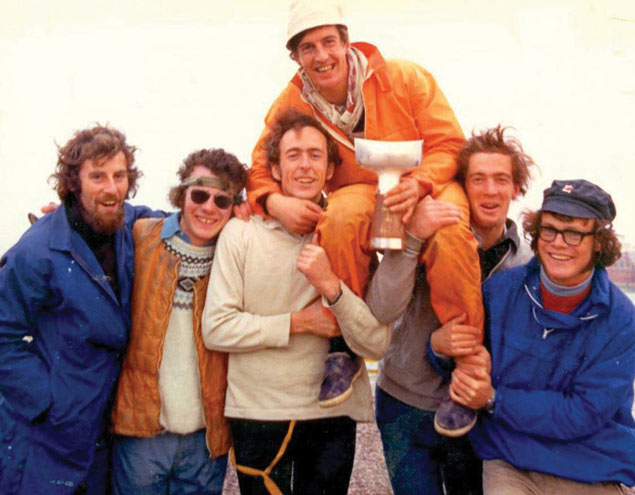 1972 RYA Dunhill Team Championship finalists include Paddy Blaney, Paul Cassidy, Peter Craig, Brian Craig, Vincent Delaney and Johnny Ross Murphy Photo: courtesy royal St. George YC
1972 RYA Dunhill Team Championship finalists include Paddy Blaney, Paul Cassidy, Peter Craig, Brian Craig, Vincent Delaney and Johnny Ross Murphy Photo: courtesy royal St. George YC
The young pretender of the fifties Allan Price from WKSC is joining the festivities and planning to reacquaint himself with the ‘Ancient Mariners’ The Ra, Johnny Hooper and Peter Gray. The Craig brothers. Brian and Peter and John Ross Murphy will be reminiscing over their victories over the Price Twins.
Adrian Lee & Partners have kindly sponsored the prizes for the weekend event.
This article has been updated: It was originally reported that the 70th IDRA/ITRA Team Racing Trophy to be raced for was the 'John Hooper Trophy' originally presented by Johnny & Gary Hooper's late father for the IDRA Team Racing. This was not the case and the trophy being raced for was the Miss Betty IYA junior team racing trophy presented by Clayton Love Snr. now dedicated for the National Championships. Apologies to Johnny & Gary for the mistake.
Wexford Boat Club to Host First IUSA Team Racing Event of the Season
The first Irish Universtiy Sailing Association (IUSA) Team Racing event of the year will be held in Wexford Harbour Boat and Tennis Club this weekend (12th – 14th of October) with flight sheets to be posted later this week.
One of the competing teams, UCD Sailing Club, was afloat at Dun Laoghaire Harbour last weekend practising over a short course inside the marina walls in anticipation of the launch event of the varsity year.
It will be a chance for teams to challenge UCC after their success at the Intervarsity championships at Kilrush on the Shannon Estuary back in March.
'Reachers' Victorious at Royal St. George's Elmo Cup
This weekend the fourth annual Elmo Trophy took place in the Royal St George Yacht Club. This is a team racing event for teenagers aged up to nineteen–years old. This year sixteen teams from all around the country travelled to Dublin to compete.
On Saturday morning the sailors came down to rig the twelve George fireflies and a flight of TRs kindly donated to the event by Sutton Dinghy Club. Racing was postponed until the wind filled in and then the race committee successfully completed 58 races in challenging light and shifty conditions. The sailors finally got off the water at 5:15 pm after a long day of team racing in the blistering sunshine.
On Saturday evening 120 people gathered into the yacht club’s dining room for a formal dinner. Speeches were made thanking all the volunteers and parents who had helped throughout the day and in the run-up to the event, in particular to John Sheehy, who organised and coordinated the event alongside Elaine Malcolm.
On Sunday morning the suncream was administered and again the 16 teams took to the water to complete another round robin in their respective fleets; Gold, Silver and Bronze. After intensive racing, 8 teams made it into the final knock out stage. ‘The Reachers’ emerged victorious in the final and narrowly beat the team ‘Lasers’ in the last upwind in the third race of the final. ‘George Ezra’, one of the five teams from the Royal St. George Yacht Club, came third overall.
At the prize giving, Frank Elmes presented the trophy to the winning team, Tom Higgins, Clare Gorman, Peter Fagan, Nell Staunton, Jack Fahy and Sarah Seymour. The perpetual trophy was kindly donated by Sage Pay and is named after the late Graham Elmes, the founder of the Irish Team Racing Association.
Over the weekend 119 high-quality races of team racing were sailed.
The Annual Rambler 100 Team Racing Event was held on Sunday at Baltimore Sailing Club. This event encourages all young sailors to compete as helms or crew with a combined age of no more than 30 years. The competition sees two teams race - 2 boats versus 2 boats. Nearly 50 sailors signed up however, the early morning fog did nothing to dampen their spirits.
The trophy was very kindly donated by George David to commemorate the capsize and subsequent rescue of the Rambler 100 crew on August 15, 2011 off the Fastnet Rock. This was the 8th time the event had been contested and this year was just as competitive and exciting for all sailors and spectators.
Registration was held while everyone waited for the fog to lift. A race briefing was then held along with team announcements giving the sailors time to prepare their boats. Thankfully, the fog cleared and crews took to the race course in the harbour within sight of the pier. It was a hectic schedule of races - 30 races initially to complete the round robin before the semi finals and final races took place.
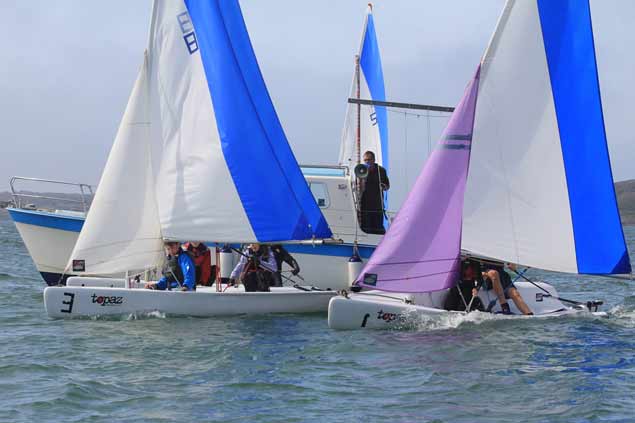 The Rambler100 team racing competition at Baltimore Sailing Club
The Rambler100 team racing competition at Baltimore Sailing Club
There was a nail biting final (best of 3) with Eoin Horgan’s team winning two to secure their win but not before a broken mast delayed proceedings. After racing all sailors then headed for home to enjoy pizza and the prize giving in the Clubhouse. Commodore Niall O’Neill thanked everyone for their assistance in running the event with particular mention to Maria Coleman.
Third Place team - Keelin Greene (captain) with crew Emer O'Neill, Sarah O’Flynn (helm) with crew Jenya Kelly.
Second place team - Cillian Walsh (captain) with crew Jenny O”Brien, Katie O’Keeffe (helm) with crew Seamus Griffiths.
The winning team was Eoin Horgan (captain) with crew Jonjo Coleman, Richard Bushe (helm) with crew Richard Buckley.
UCD Sailing Team Success on the Liffey at Annual Colours Match
This years Colours match between UCD Sailing Club (UCD SC) and Dublin University Sailing Club (DUSC) was held on Saturday the 14th of April in Dublin City.
UCD SC successfully brought home the Colours trophy which was won by DUSC at last years Colours. With a newly introduced format as of last years competition the results of all the teams counted, and UCD 2 sealed the deal at the last minute securing the necessary result. UCDSC Commodore Roisin O’Brien along with her committee organised the one day event which took place on the Liffey.
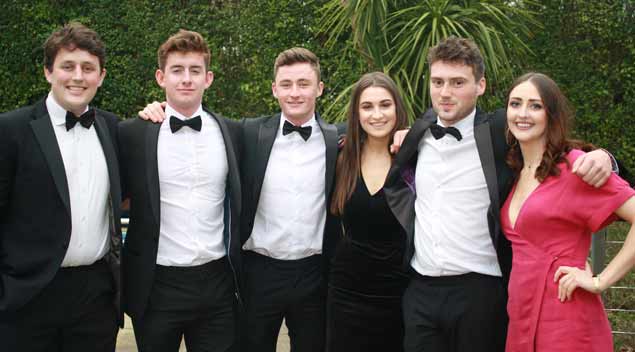 The UCD2 team left to right: Richard Flood, Daniel Raymond, Jack Higgins (keelboat Captain), Roisin O'Brien (Commodore), Patrick Cahill (Sailing Captain), Fionnuala Cahill
The UCD2 team left to right: Richard Flood, Daniel Raymond, Jack Higgins (keelboat Captain), Roisin O'Brien (Commodore), Patrick Cahill (Sailing Captain), Fionnuala Cahill
This win comes after a successful few weeks for UCDSC, winning the Silver fleet at the IUSA Inter-varsities, won overall by UCC, as well as UCD 1 coming third and attending the BUSA Championships in Scotland. UCD1 and UCD2 came 2nd and 3rd respectively, and UCC came1st, in the IUSA Student Yachting Nationals in Howth Yacht Club where UCC took home the trophy, also organised by UCDSC the weekend previous.
As the college sailing club breaks up for exams and the summer season the students now look forward to what next year brings.
Schools National Team Racing Championships 2018 at Schull Cancelled Due to Strong Wind Forecast
This weekend's Schools National Team Racing Championships 2018 at Schull in West Cork has been cancelled due to a strong winds forecast.
The 13–team event, open to qualified teams from regional events, has been rescheduled for September and will sail in Schull's own TR 3.6 dinghy fleet.
Southerly winds are forecast to reach 30 mph from midday on Saturday.
The annual Irish University Sailing Association Intervarsity Team Racing Championship is the first major event to signal the new season, and 2018’s – at Kilrush on the weekend of March 9th to 11th – was vintage stuff. There were 28 teams taking part, including two from Scotland, in a series jointly organised by University College Cork and National University of Ireland Galway
In all, 194 sailors and supporters descended on the Shannon Estuary sailing mecca, and in a massive championship which saw 188 races being sailed, the final came down to Battle Royal in the excellent sailing conditions of a light to moderate westerly. This resulted in University College Cork 1 winning from the Scottish national team, Scottish Student Sailing, with UCD 1 placing third.
The organisation of an event of this scale is mind-boggling, but the multi-functonal Kilrush Marina’s many facilities were well able for it. Top skills were to be found afloat, where 28 different team captains had to keep their highly individualistic squads on message. Although it’s quintessentially a team event, inevitably it is the Captain of the winning team who is highlighted, and at Kilrush it was Brendan Lyden who led UCC 1 to victory and acclamation as “Sailor of the Month (Inshore)” for March 2018.
However, it being a team effort, it’s only fair to mention that the other two helms were Fionn Lyden and Aodh Kennedy, while the crews in the final were Jill McGinley, Sinead Barnett, and Lisa Smith. Next year’s event will be up on the lake at Blessington in West Wicklow, hosted by Trinity College Dublin.
New NUIG Sailing keelboat Centre Stage at Connacht Schools Team Racing Championships on Galway Bay
The Connacht Schools Team Racing Championships was in full swing at the Galway Ocean Sports Club over the weekend with competition between St. Enda's and Carraroe Schools that had NUIG sailing team racers in the mix too.
Galway City Sailing Club hosted the event that qualifies west of Ireland crews for the Irish Team Racing National Championships in Cork.
Also on show at the event, and serving as the Committee Boat for the team racing, was the Port of Galway supported new NUIG Sailing keelboat (pictured above).


























